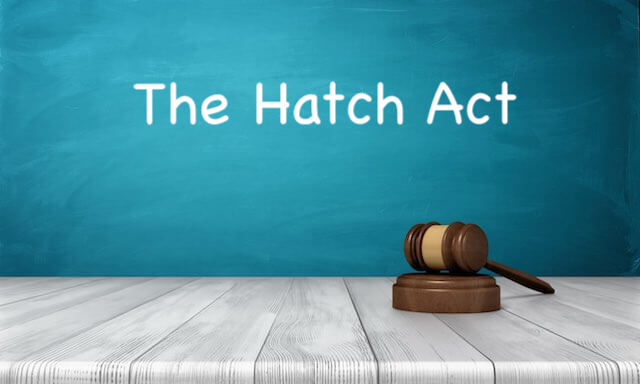Latest Reported Hatch Act Violations
The Office of Special Counsel (OSC) has announced unpaid suspensions for two federal employees for violating the Hatch Act. One is for 130 days for an employee of the Federal Deposit Insurance Corporation (FDIC), and the other is for 90 days for the US Coast Guard.
2024 is an election year. National elections always bring out a compulsion by a few federal employees to demonstrate their political emotions by working on behalf of a candidate for political office or otherwise engaging in partisan political activity. Agencies routinely announce how the Hatch Act limits political activity, but the message never gets through to everyone.
OSC did not provide many details in reporting these new violations. But, with the heavy use of social media, one case shows how a program like Facebook can damage an employee’s federal career.
A Federal Deposit Insurance Corporation (FDIC) employee violated the Hatch Act by soliciting political contributions for two different partisan political candidates and engaging in political activity while on duty.
The FDIC employee hosted a fundraising event at his home for a candidate for partisan political office. The federal employee also solicited donations for a different candidate. OSC’s investigation found that while on duty, the employee also sent emails organizing a campaign event he hosted for a third candidate for partisan political office.
The Coast Guard employee violated the Hatch Act by engaging in political activity while on duty and/or in the federal workplace, soliciting political contributions, and using her official authority to affect the results of an election.
These were not recent violations. They took place between 2019 and 2021. The employee posted 18 notices on Facebook supporting or opposing candidates in the 2020 presidential election, candidates for congressional office, or political parties. In addition, OSC found the employee posted requests on her Facebook account for donations to political candidates or political groups.
Prior to taking most of these actions, OSC had advised the employee about the Hatch Act and how it applied to her social media use. The employee agreed to a 90-day unpaid suspension for her violations.
Interesting Hatch Act Act Violations by Federal Employees
While most federal employees are never charged with violating the Hatch Act, some actions are hard to ignore. Here are some of the more interesting ways in which federal employees have displayed their political preferences and have been found to have violated the law against partisan political activity:
- Posting their political beliefs while on duty,
- Announcing a fundraiser for a candidate while on duty,
- Telling a political “joke” while on duty,
- Delivering a political chant to members of the public calling a federal agency,
- Running for public office and using the agency logo in campaign literature or
- Advocating the “Obama Shuffle” (among other activities).
What Does the Hatch Act Do?
The Hatch Act limits the political activity of federal employees and some state, District of Columbia, and local government employees who work with federally funded programs.
The law’s purpose is to ensure federal programs are not administered politically, protect federal employees from political coercion in the workplace, and ensure federal employees are promoted based on merit instead of political affiliation or allegiance to a candidate or political party.
Enthusiasm for a candidate or an issue will overcome individuals who never saw, never read about, or do not remember the periodic announcements issued regarding the Hatch Act and the impact it can have on a federal employee.
The most critical portions of the law are found in 5 U.S. Code § 7323 and § 7324. The Hatch Act means that a federal employee may not “use his official authority or influence to interfere with or affect the result of an election.”
The Hatch Act is often enforced against career federal employees but rarely against senior political appointees.
OSC Advice on Using Social Media
As social media has become commonplace, there are now ways to reach large numbers of voters quickly and easily. As happened in the case of the Coast Guard employee, a program like Facebook can be used to violate the Hatch Act.
Here is advice issued by OSC on using social media.
- Federal employees may display campaign logos or candidate photographs as their cover or header photo at the top of their social media profiles on their personal Facebook or Twitter accounts.
- Federal employees may display campaign logos or candidate photographs as their profile pictures on their personal Facebook or Twitter accounts. However, because a profile picture accompanies most actions on social media, employees would not be permitted, while on duty or in the workplace, to post, “share,” “tweet,” or “retweet” any items on Facebook or Twitter, since each such action would show their support for a partisan group or candidate in a partisan race, even if the content of the action is not about those entities.
- “Further restricted employees”—similar to all federal employees—may “like” a social media post from a partisan group or candidate in a partisan race and may comment on such an entity’s social media pages when not at work. Note: No federal employee may “like” a post soliciting partisan political contributions at any time. Most further restricted employees work in law enforcement and intelligence agencies.
The lesson from these cases should be clear: If working for the federal government, pay attention to how the Hatch Act can damage or end a career in the federal civil service.




